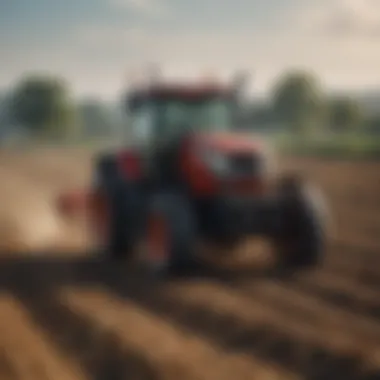Exploring MU Extension Jobs: Opportunities and Trends


Intro
Understanding MU Extension jobs in agriculture is essential for both aspiring professionals and communities dependent on agricultural sustainability. MU Extension, linked to the University of Missouri, plays a critical role in empowering local farmers, enhancing food security, and educating the public about agricultural practices. Engaging with the various roles within MU Extension allows individuals to not only further their careers but significantly impact their local environments.
The scope of MU Extension jobs is broad, ranging from agricultural educators to specialists in horticulture and veterinary health. Each position represents a direct connection to agricultural advancement, community education, and research dissemination. As we explore these roles, it becomes necessary to understand the qualifications required, the responsibilities associated with each position, and the overall impact of MU Extension services on local communities.
This article addresses the emerging trends in agriculture and how MU Extension jobs adapt to meet these changes. It also provides insights into professional development opportunities, ensuring that individuals interested in this field can find relevant paths for advancement. By examining these elements, we can appreciate how MU Extension jobs contribute to the agricultural sector's landscape and future.
Foreword to MU Extension Jobs
MU Extension jobs represent a crucial link between research, education, and practical application in the agricultural sector. The importance of these roles cannot be overstated. They directly influence local farming practices, community engagement, and agricultural productivity. Understanding the purpose and history of MU Extension jobs provides context for their significance in today's dynamic agricultural landscape.
Definition and Purpose of MU Extension
MU Extension serves as an avenue for disseminating research-based information to farmers and rural communities. Its principal purpose is to enhance agricultural practices through education, allowing farmers to implement proven techniques that bolster productivity and sustainability. Fields of focus include crop production, livestock management, environmental stewardship, and community development. By equipping individuals with the necessary skills, MU Extension supports a more educated citizenry, capable of making informed decisions.
Historical Context of Extension Services
The roots of extension services can be traced back to the 19th century. As agriculture began to change with technology and globalization, the need for education became apparent. Notably, the Smith-Lever Act of 1914 established a system of agricultural extension services in the United States. This initiative aimed to create a bridge between agricultural research conducted at universities and the farming community. Over the decades, MU Extension has evolved, adapting to challenges and innovations in the agriculture sector. The commitment to serving local communities remains constant, highlighting the enduring relevance of these jobs in contemporary society.
"The goal of MU Extension is to extend knowledge and resources that will impact lives and communities positively."
In summary, the introduction to MU Extension jobs provides essential insights into their definition and historical context. These roles serve as a backbone for agricultural education, vital for fostering healthy and sustainable farming practices.
Roles and Responsibilities
Understanding the roles and responsibilities associated with MU Extension jobs is crucial. These positions serve as a bridge between academic research and practical application in the agricultural sector. Professionals working in these areas not only facilitate education but also enhance community engagement, drive economic development, and advocate for sustainable practices. This section will explore various aspects of these roles, detailing how they contribute to the success and growth of the agricultural community.
Educational Outreach and Advocacy
Educational outreach is a fundamental component of MU Extension work. Extension professionals engage with farmers, producers, and the general public to disseminate knowledge about best practices in agriculture. They conduct workshops, seminars, and demonstrations, aimed at improving agricultural techniques and productivity. Their advocacy efforts often involve raising awareness about new technologies and methods that can help farmers adapt to changing environmental and market conditions.
The importance of educational outreach lies in its direct impact on agricultural efficiency. When farmers gain access to the latest research findings and methodologies, they can make informed decisions that increase their yields and profitability. Moreover, educational initiatives foster a sense of community, encouraging collaboration among farmers and strengthening local economies.
Research Collaboration and Support
Collaboration between extension professionals and researchers is vital for the advancement of agricultural practices. These professionals often work closely with universities and research institutions to translate research findings into practical applications. By doing so, they ensure that farmers are equipped with the most up-to-date information and techniques.
Support in research also involves identifying local issues and challenges that require attention. Extension staff play a key role in gathering data and feedback from the farming community, which researchers then use to focus their studies. This symbiotic relationship not only enhances research relevance but also empowers farmers to be part of the solution. Effective research collaboration leads to innovative practices that bolster agricultural resilience and sustainability.
Program Development and Implementation


Program development is another critical responsibility of MU Extension jobs. This involves creating tailored programs that address specific community needs. Extension professionals analyze local agricultural trends and challenges, utilizing this information to design programs that effectively meet the needs of farmers and stakeholders.
Implementation of these programs requires thorough planning and coordination. Extension staff must engage with various community members, stakeholders, and organizations to ensure the programs' success. They also monitor and evaluate the effectiveness of these initiatives, making adjustments as necessary. This iterative process is essential for achieving desired outcomes and fostering continuous improvement in agricultural practices.
Qualifications for MU Extension Jobs
Understanding the qualifications needed for MU Extension jobs is essential for both aspiring professionals and stakeholders in the agricultural sector. These qualifications ensure that individuals are equipped with the necessary competencies to effectively serve their communities. Properly qualified extension professionals can have a substantial impact on agricultural practices, community engagement, and educational outreach. The following subsections detail specific educational requirements, necessary skills and competencies, and advantages of prior experience and training in this field.
Educational Requirements
Typically, candidates aspiring for MU Extension positions are expected to hold at least a bachelor’s degree in a relevant field. Common educational backgrounds include agriculture, horticulture, nutrition, or educational sciences. A higher degree such as a master's can significantly bolster one’s candidacy. Many positions may also require formal training or certifications specific to agricultural practices or educational methodologies.
Courses in adult education and community development can provide key insights necessary for effective communication and outreach. Understanding local agricultural trends and challenges through educational curricula enhances the ability to provide relevant and timely assistance to farmers and community members.
Necessary Skills and Competencies
MU Extension professionals should possess a blend of hard and soft skills. Critical thinking and problem-solving abilities are vital. Professionals must analyze issues faced by agricultural communities and develop practical solutions.
Strong communication skills come into play when delivering educational programs and facilitating workshops. This involves not only presenting information but also engaging with audiences effectively. Leadership abilities are crucial, as extension professionals often guide community initiatives and collaborations.
Additional competencies include:
- Technical proficiency in agricultural technologies and practices.
- Cultural competence to work effectively with diverse communities.
- Organizational skills to manage multiple programs simultaneously.
Experience and Training Benefits
Experience in the agricultural sector or related educational roles provides practical insight into the challenges farmers face. Participating in internships, volunteer opportunities, or entry-level extension roles before pursuing full-time positions can yield meaningful experience.
Training programs focused on specific agricultural practices or educational strategies are advantageous. Many organizations offer workshops or certification courses. Participating in these training programs can be viewed favorably by potential employers. Such experiences not only build confidence but also enrich one's professional network.
Cultivating expertise in extension services can greatly enhance the efficacy of agricultural advancements and community initiatives.
Impact on Local Communities
The significance of MU Extension jobs extends beyond individual roles; these positions are pivotal in shaping the fabric of local communities. Their contribution engenders economic growth, educational improvement, and enhanced social connections. As agricultural practices evolve, MU Extension professionals facilitate adaptive strategies ensuring that communities thrive amidst changes.
Economic Development Initiatives
MU Extension jobs play a crucial role in driving economic development initiatives in rural areas. By providing expertise in agricultural practices and marketing strategies, extension professionals empower local farmers to optimize their yields and improve their marketability. This leads to increased revenue, which circulates within the community, supporting local businesses.
Moreover, MU Extension promotes diversification in farming. Farmers gain insights on alternative crops or livestock, which can minimize risks associated with reliance on a single source of income. These efforts help in building a resilient agricultural economy.
Key elements of economic development initiatives include:


- Access to Resources: Provision of educational materials and technologies helps farmers adopt modern practices.
- Workshops and Training Programs: Regular training sessions help enhance skills and knowledge in effective farm management and sustainable practices.
- Collaborative Projects: Partnership opportunities with local businesses and organizations facilitate resource sharing and innovation.
"Investing in local agriculture is not just about growing crops; it’s about growing communities."
Educational Advancements for Farmers
Farmers often face the challenge of keeping pace with innovations in agricultural practices. MU Extension addresses this gap through educational advancements tailored to local needs. By offering workshops, field days, and Informational resources, these professionals promote best practices and new technologies.
Topics covered in educational programs include:
- Sustainable Agriculture: Methods that reduce environmental impacts while maintaining productivity.
- Financial Management: Training in budgeting and investment strategies for effective farm management.
- Pest Management Strategies: Educating farmers on safe and effective pest control methods.
These advancements foster a community of continuous learning. Farmers equipped with knowledge can make informed decisions that positively affect not only their farms but also the wider community.
Social Connectivity and Support Networks
Beyond economic and educational impacts, MU Extension jobs foster social connectivity and support among community members. The extension professionals serve as liaisons, connecting farmers with resources and expertise, thus creating a strong network.
Through initiatives like local advisory councils, farmers can engage in discussions, share challenges, and suggest community-based solutions. This sense of belonging is critical, especially in rural settings where isolation can be a concern.
Programs that enhance social connectivity include:
- Support Groups: These groups provide a platform for farmers to discuss mental health, stress management, and work-life balance.
- Community Events: Engagement in local fairs and farmer’s markets fosters relationships, allowing individuals to support one another.
- Resources for Networking: MU Extension facilitates connections that help farmers find mentors or collaborators for various projects.
In summary, the impact of MU Extension jobs on local communities is profound. They ignite local economies, enhance farmers’ knowledge and provide essential support networks—all critical components in fostering vibrant and sustainable rural communities.
Emerging Trends in Extension Work
Emerging trends in extension work reflect the changing landscape of agriculture and the need for innovative solutions. As the agricultural sector evolves, these trends hold significant implications for MU Extension jobs, affecting their roles and effectiveness. Understanding these trends is crucial for professionals looking to align with new demands and provide relevant services to their communities.
Technology Integration in Extension Services
The integration of technology into extension services is transforming how outreach and education occur. Digital tools, such as mobile applications and online platforms, enable extension agents to reach a broader audience than traditional methods. For instance, webinars and virtual training sessions allow for greater flexibility and participation, especially in rural areas where access to resources may be limited.
Moreover, data analytics can enhance programmatic focus by identifying the specific needs of farmers. Extension professionals can utilize this data to tailor resources, making them more efficient and impactful. Technologies such as Geographic Information Systems (GIS) help in mapping out agricultural trends, guiding effective decision-making for local farmers. The enhancement of connectivity through technology is not merely a trend; it’s becoming a necessity for effective extension work.
Focus on Sustainable Agriculture Practices
Sustainable agriculture is a growing focus within MU Extension jobs. The need for environmentally sound practices is becoming urgent due to climate change and resource depletion. Advanced training programs are now incorporating these concepts, ensuring that farmers adopt practices that conserve resources while maintaining productivity.
Extension professionals play a critical role in educating farmers about sustainable methods such as crop rotation, integrated pest management, and organic farming techniques. This focus not only benefits the environment but also contributes to the economic viability of local farms. The long-term success of agriculture depends on these practices, and MU Extension is at the forefront of this transition.
Community-Based Participatory Research


Engaging communities in the research process has emerged as an essential trend within extension work. Community-Based Participatory Research (CBPR) emphasizes collaboration between researchers and community members. This approach ensures that the research conducted is relevant and grounded in the actual needs of local farmers and stakeholders.
By involving farmers in the design and implementation of research, extension services can foster a more inclusive environment. The insights gained from this collaboration lead to more applicable solutions to local problems. Success stories from CBPR illustrate how shared knowledge creates stronger, resilient agricultural systems better capable of responding to challenges.
"Emerging trends in extension work highlight the necessity for adaptability and continuous learning within the agricultural sector."
Career Pathways in MU Extension
Career pathways within MU Extension offer diverse opportunities for individuals passionate about agriculture and community service. Understanding these pathways is essential for aspiring professionals as it provides a roadmap for career progression and enhances the value of extension work.
Traditional Roles Within Extension
In traditional settings, MU Extension professionals often serve as educators, providing crucial information to farmers and community members. They take on roles such as agricultural specialists, family and consumer science educators, and 4-H youth development agents. These roles focus on delivering research-based knowledge and practical skills to improve agricultural productivity and enhance community welfare. The professionals engaged in these roles not only share their knowledge but also facilitate workshops, develop educational materials, and provide one-on-one consultations. This direct outreach is vital for fostering community relationships and implementing effective educational strategies.
Advancement Opportunities for Professionals
Advancement within MU Extension does exist and can occur through various means. Individuals can pursue higher education degrees, which often lead to positions with greater responsibility or specialized functions. For example, an agricultural educator might move into a program director role or take on leadership positions within specific projects or initiatives. Continuous professional development is encouraged, including workshops and certifications that enhance specific skills. Networking within the extension community can also open doors to new opportunities, as relationships built over time can lead to collaborations or new positions. Thus, professionals have pathways to take their careers to new heights while contributing to their communities.
Non-Traditional Pathways and Collaborations
In recent years, non-traditional pathways have emerged for MU Extension jobs. These pathways may include collaborative roles with private companies, non-profits, or research institutions, expanding the scope of work beyond the typical government positions. Innovative partnerships provide opportunities to engage in community-led research or projects that focus on local needs. Additionally, professionals not originally from agricultural backgrounds have found niches by applying their expertise in technology, marketing, or education to enhance extension services.
This flexibility in roles allows MU Extension to adapt to changing societal needs and ensures that professionals with diverse backgrounds can contribute meaningfully.
Through all these different pathways, MU Extension jobs remain crucial for advancing agriculture and supporting community development. By exploring these career options, individuals can find their unique place within the extension framework, ensuring that they contribute to meaningful change in their communities.
The Future of MU Extension Jobs
The subject of MU Extension jobs is not merely a matter of current roles but rather a reflection of ongoing developments in the agricultural sector. Understanding the future of these jobs is crucial for several reasons. First, it allows stakeholders to anticipate the types of skills and qualifications that will be in demand. Second, it highlights the adaptability required within MU Extension roles, given the rapid advancements in technology and shifts in agricultural practices. Finally, it underscores the necessity of continuous professional development to remain relevant and effective in extension services.
Forecasting Changes in Employment Trends
As we look ahead, it's essential to consider how employment trends in MU Extension may evolve. Factors influencing these trends include demographic shifts, increasing access to technology, and changes in agricultural policies.
- Demographics: Younger generations are entering the workforce with a different set of expectations and interests. Their engagement with technology and social media is shaping how information is disseminated and how services are delivered.
- Technology: The integration of digital tools into agriculture is growing. This trend opens new possibilities for remote learning, virtual workshops, and online consultations in extension work. Consequently, the demand for tech-savvy professionals will likely rise.
- Policy Changes: Fluctuations in agricultural policy, driven by environmental concerns and market demands, will continue to dictate the focus of extension programs. Adapting to these changes will be critical for professionals in this field.
Evolving Roles in a Modern Context
The roles within MU Extension are changing in response to modern needs. Traditionally, extension agents focused on specific areas of agriculture. Today, the scope of these roles is expanding.
- Interdisciplinary Collaboration: Professionals are increasingly expected to collaborate across disciplines. This means understanding not only agronomy but also economics, health, and social sciences.
- Community Engagement: Engaging local communities has taken on new forms. Extension workers must foster relationships with diverse groups and create inclusive programs that address varying needs within communities.
- Advocacy and Education: Beyond providing information, extension professionals now play a vital role in advocating for sustainable practices and educating stakeholders on emerging issues like climate change and food security. This shift is vital for creating more resilient agricultural systems.
Importance of Lifelong Learning
In the context of MU Extension jobs, lifelong learning has become more than just a recommendation; it is essential.
- Adapting to Change: The speed at which agricultural methods and technologies are evolving means that professionals must continually update their knowledge and skills. This necessity extends to understanding new research, adapting to market changes, and implementing innovative practices.
- Professional Development Opportunities: Various avenues exist for ongoing professional development, including workshops, online courses, and certification programs. By engaging in these learning experiences, extension agents can elevate their capabilities and improve their service delivery.
- Building Networks: Engaging in lifelong learning also helps professionals build networks, fostering collaboration with peers. These connections are valuable for sharing best practices, insights, or resources that support community needs.
"Lifelong learning is not just beneficial; it is a requirement in today’s rapidly changing environment of MU Extension jobs."















